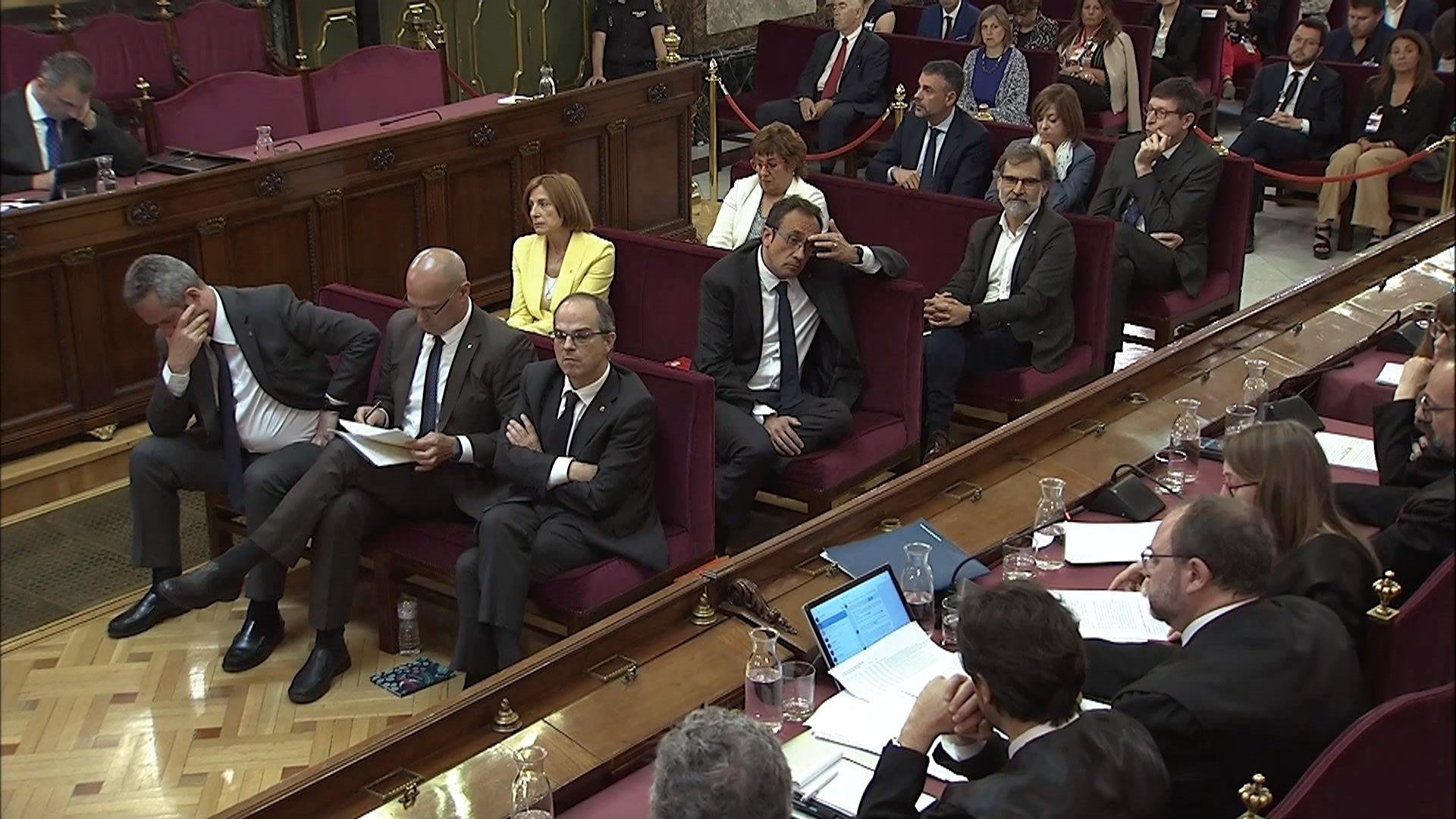After a trial lasting four months, the last turn to speak was for the defendants. The twelve, sitting back in the centre of the courtroom, took to the microphone to restate their beliefs, argue for the issue to return to the realm of politics, call for dialogue, thank their families for their support... and to warn the judges of the importance of the decision they will have to take.
The room, filled to bursting. On the front row of the audience, Catalan president Quim Torra and speaker of the Catalan Parliament Roger Torrent, heading a wide-ranging representation of the world of politics which today required the clearing of the benches normally occupied by the media.
At the very start of his speech, Oriol Junqueras evoked Petrarch's Il Canzoniere to warn that it would do little good to speak if nobody was listening. And the court listened attentively to each and every one of the prisoners who presiding judge Manuel Marchena called up one after the other, warning them that they couldn't speak more for than the fifteen minutes that had been agreed.
Junqueras took up just five of his minutes, ending by calling for the Catalan conflict to be brought back to politics. To dialogue, negotiations and agreements. Raül Romeva said that it wasn't just the twelve of them in the dock, but more than two millions, for which reason he called on the judges to be brave when it comes time for them to decide.
To the right when looking at the judges, public prosecutors Jaime Moreno and Fidel Cadena, who had to take criticism from the defendants, followed the speeches with more politeness than interest. Their colleagues Javier Zaragoza and Consuelo Madrigal weren't there. The state's solicitor, Rosa María Seoane, was. The two representatives of the private prosecution, deputies for far-right party Vox Javier Ortega Smith and Pedro Fernández, avoided even looking at the defendants. In fact, Ortega let out the odd yawn.
Joaquim Forn noted at the very start of his remarks that he's spent almost 600 days in prison. He criticised the fact that, as he sees it, he's being condemned for his ideas, but said he'll continue fighting for democracy in Catalonia and its right to self-determination. "I don't believe it's a crime," he said.
Listening from the public benches were his wife and daughter, sitting with friends and relatives of the other defendants. As the speeches went on, the emotion grew in the court.
It grew in the defendants' voices too. Jordi Turull warned the judges that "Catalonia doesn't know the word resignation", but his voice broke when he thanked his family for their support. Josep Rull evoked "the government of the legitimate president, Carles Puigdemont" and said "we'll get through it".
"I wouldn't like to be in your shoes", Jordi Sànchez said. He quoted Socrates and Hannah Arendt, and the "Lamardi rule" created by a prisoner he met in Lledoners, according which no door stays shut forever. It was a curious moment when, despite the tension, Sànchez managed to get a smile from those present, including some of the judges, before stating his conviction that Catalonia will also manage to open the door.
The most direct attack against prosecutors was from Carme Forcadell who, dressed in a yellow jacket and trousers, said she had already suffered "447 days of unjust imprisonment" before going over the inaccuracies and errors in the report from the prosecutions. "I hope you take into account all these circumstances and judge all the proven facts and not the false speculations which are out of tune with reality," she told the judges.
Dolors Bassa reaffirmed her convictions as she warned the judges of the importance of the decision facing them. A decision which she says will not only mark the final years of her life, but the "start of the solution for many people".
The majority of the speeches didn't take up the full fifteen minutes they were assigned, but did give quotes which echoed between the red and damask walls of a room which saw a disturbingly similar trial in another trial 84 years ago.
Last of the prisoners to speak was Jordi Cuixart. He made it clear he sees himself as a political prisoner and that he has always acted with conscience and coherence. "Everything I did, I would do it again", he repeated at the beginning and the end of his remarks. Looking at the judges, he responded to the question of whether he encouraged the people of Catalonia to take to the streets, exclaiming in Catalan: "Catalans, peaceful mobilisation: democratic, permanent and civil".
Santi Vila was first up from the defendants who still have their freedom. When he started speaking, president Torra left the room for a few moments, sparking all manner of comments. After a short recess, it ended with Meritxell Borràs and Carles Mundó, who insisted that the trial is a failure of politics and expressed his hope, "surely shared by millions of people", that the prisoners will be set free.
Much earlier than expected and after four months of hearings, the Catalan independence trial then ended and Marchena announced the judges would retire to consider their verdicts and sentences.

